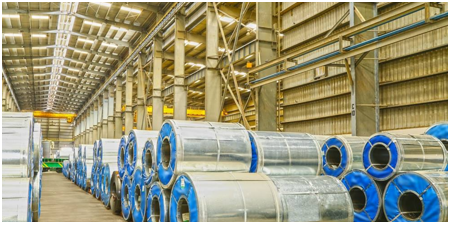INP-WealthPk
Shams ul Nisa
The steel industry is facing significant difficulties due to the declining prices, high energy costs and fluctuating global market, coupled with the domestic economic challenges, WealthPK reports.

During the 1QFY25, the hot-rolled coil (HRC) prices reduced from $510 per ton to $480 per ton, ringing alarm bells among the local manufacturers struggling to maintain profitability. Additionally, the international steel market is influenced by the fluctuating demand, particularly from major consumers like China, the United States, and Europe. Since China is a key supplier of steel to the world market, and its economic slowdown has led to a decline in consumption, steel consumption has been depressed further by the decrease in China's real estate market. Additionally, the increase in materials from tax-exempt FATA/PATA territories has further worsened the steel market.
Furthermore, the local steel market has witnessed tough competition from imports, exacerbated by the recent policy changes. Aisha Steel Mills Limited (ASML), one of Pakistan's leading steel producers, reported a 57% decrease in net revenue to Rs4.58 billion during July-September 2024 quarter compared to Rs10.59 billion in the same period last year. This decline is attributed to the reduced domestic demand and increased competition from the imported steel products. According to the ASML's financial results on the Pakistan Stock Exchange (PSX), the company struggled with a net loss of Rs843 million compared to a net profit of Rs35.2 million in 1QFY24.
Aisha Steel Mills Limited was established in Pakistan on May 30, 2005, as a public limited company. The company's primary activity is producing and marketing cold rolled coils and hot dipped galvanized coils. The company operates a cold rolling mill and a galvanization plant located in the downstream industrial estate of Pakistan Steel in Bin Qasim, Karachi. During the review period, the company reported an operating loss of Rs86.9 million, down by 110.04%. Furthermore, the company's exports reduced significantly to 1,975 tons in 1QFY25 against 2,463 tons in 1QFY24. Another major factor which affected the steel market was the increase in supply, as the production kept on growing, causing surge in inventory.
Recently, there was a slight recovery in the international HRC prices, and there was cautious optimism regarding a potential recovery in demand. However, local manufacturers remain cautious about future sales volumes, as the overall outlook remains uncertain due to fluctuating global market conditions. Therefore, the coming months will be critical for the local steel industry to rebound from its current struggle. Hence, the company is implementing strategic initiatives such as reviewing product offerings, exploring partnerships, adopting innovative technologies, and evaluating market trends to align with the industry demands.
Credit: INP-WealthPk













